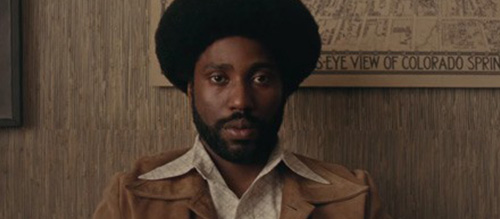BlackKklansman (2018) Review
This article was originally published on SSP Thinks Film by Sam Sewell-Peterson.
BlackKklansman (2018)
Director: Spike Lee
Screenwriters: Spike Lee, David Rabinowitz, Kevin Willmott, Charlie Wachtel
Starring: John David Washington, Adam Driver, Topher Grace, Isiah Whitlock Jr., Robert John Burke, Brian Tarantina, Michael Buscemi, Laura Harrier, Alec Baldwin
I’m still reeling from the final moments of BlackKklansman – no other film from 2018 will pack quite as forceful a denouement. Nowhere else is Spike Lee’s mastery of blending of subjective emotion-driven storytelling with documentary filmmaking techniques more apparent, though the rest of the film is a real ride.
Ron Stallworth (John David Washington) becomes the first African American cop in the Colorado Springs PD and volunteers to infiltrate the local chapter of the Ku Klux Klan, making introductions by phone and persuading Jewish white colleague Flip Zimmerman (Adam Driver) to stand in for him in person. With black student protests against police brutality and the Vietnam War ramping up, Ron and Flip witness the KKK preparing something big for when Grand Wizard David Duke (Topher Grace) comes to town…
I know a lot of people can find Spike Lee pretty insufferable. He can come across as preachy and righteous (especially in the last decade where his outspoken persona has bordered on self-parody), but BlackKklansman could, and should, be the movie that makes everybody take him seriously again.
The film isn’t subtle, but it couldn’t be more relevant and timely. Lee and his co-writers get about as explicit as they could possibly get using the film to rip Trump and his supporters a new one. From Alec Baldwin’s TV pundit’s terrifying populist rhetoric in the opening propaganda piece to a scene where two characters practically turn to look at the audience as they talk about what the American people would “never vote for”, and the KKK declaring absolute hokum about eugenics as “indisputable fact”. Alternative facts indeed.
Lee isn’t even remotely interested in explaining the Klan or its membership, what drives them – it’s their horrific actions that matter. Much the same as today, racial prejudice in the 1970s came from ignorance and a place of fear, the privileged paranoid about losing that privilege, and the film respects its audience enough to not have to spell something so obvious out.
Lee picks apart American perceptions of themselves over the decades. He ridicules the absurdity of “White America” being the default and African Americans having to fit in to that, and if they’re lucky enough to have lighter skin they can (and did) “pass for white”. Many of these contradictions and ingrained injustices were covered in Ava Duvernay’s harrowing document 13th, but Lee builds them all into an engrossing and bizarre sorta-biopic, a true story with dramatic licence. Things may have been exaggerated to make the most of storytelling in this medium, but sometimes Lee just steps back, downs his tools and lets his subjects simply tell their tale to emotionally devastating effect.
Ron Stallworth is stuck between two worlds, not just because of the colour of his skin but because he joins and represents an ignorant, racist organisation in order to infiltrate an even worse one. He wants to make his own way in the world, make his mark with his own bold and risky investigation but, as a black man in the time and place he is in, he is only able to do so with the permission of his white superiors, white superiors who will categorically not have his back if things go south. The “other Ron Stallworth” Flip is potentially in more immediate danger being in and amongst Klan machinations and thus has his own fair share of self-identity doubts, but at the end of the day he is still white. Jewish, but white. It wouldn’t have been a surprise to see both Washington and Driver in contention for the acting prizes at the Oscars.
Thankfully a film with such a potentially grim subject matter is broken up by moments of levity, jokes at the expense of moronic figures of authority and, in one scene, the very special sight of Adam Driver being taught to sing James Brown convincingly.
Angry Spike Lee is a far more compelling figure than righteous Spike Lee. This is the film America needs right now. When it comes down to it, Lee wants us to know that there is no winner in a race war, and he tells us this with mischief, style and attitude to spare.
19/24
By Sam Sewell-Peterson
You can support Sam at the following links:
Website – SSP Thinks Film
Twitter – @SSPThinksFilm
[DISPLAY_ULTIMATE_SOCIAL_ICONS]


